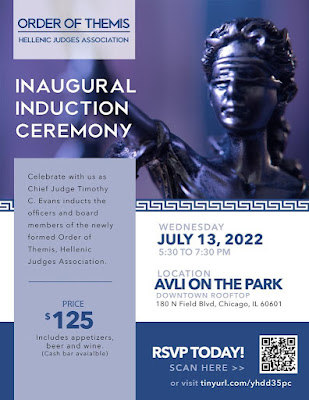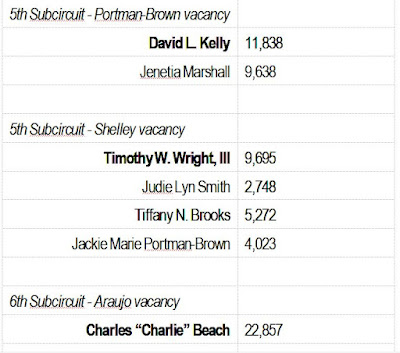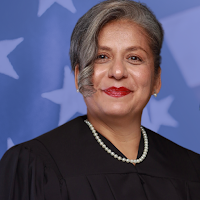About Judge Gudino, certainly. But about much more than Judge Gudino as well.
Let us assume -- indeed, let us stipulate -- that the facts as reported yesterday in the
Injustice Watch story by Carlos Ballesteros and Maya Dukmasova, "
Cook County judge accused of physical and verbal harassment when she was a prosecutor; office says allegations were 'unsubstantiated,'" are 100% accurate, namely, that there is a memo, written in 2018 by now-Judge Gudino's then-supervisor in the Office of the Cook County State's Attorney, which memo purports to document incidents of harassment and other unseemly conduct by Gudino toward her fellow ASAs. Given the most innocent construction possible, the memo
at best sketches a person who cannot get along or work well with her colleagues.
There appears to be documentation -- the damning memo -- so there should be no reason not to run with the story, right?
I'm not an editor. But, if I were, and this story was presented to me, the documentation notwithstanding, I would want some additional questions answered, or at least explored, before I would let the story out. If I let it out at all.
Why is this memo only coming to light now?
In any sensational last-minute election story, the timing is always suspcious. We're used to these 11th-hour bombshells in other kinds of campaigns. In other elections candidates and their supporters are often anxious about an "October surprise." These kinds of stories are always damaging, but not always true. The veracity of the sensational challenges can not always be properly explored in the pressure-packed days before the election.
In judicial elections the timing is even more suspicious. And troubling. And why do I say that?
Because we have, or think we have, a very thorough evaluation system for judicial hopefuls -- two independent systems, actually -- the original, run by the Chicago Bar Association, and the other, run by the 12-member Alliance of Bar Associations for Judicial Screening.
The complete evaluations of Judge Gudino released by each of these bar groups is set out, in full, in my
Organizing the Data post for the race in which Judge Gudino is a candidate.
But to summarize, Gudino was found qualified or better by every bar group that evaluated her credentials (the Arab American Bar Association did not evaluate Gudino, but that was not the candidate's fault). The Lesbian and Gay Bar Association of Chicago and the Puerto Rican Bar Association found Gudino Highly Recommended; the Hispanic Lawyers Association of Illinois found Gudino Highly Qualified.
The Chicago Bar Association said Gudino is "well regarded" for her "excellent demeanor and temperament." The Chicago Council of Lawyers said Gudino is "praised for having an even keel temperament and for being hard-working." The Illinois State Bar Association said, "Attorneys report that [Gudino] is an excellent attorney with good litigation skills, professional, and a hard worker."
These evaluations are not pulled out of the ether, or from a crystal ball; rather, they are the product of lengthy, independent, and
confidential investigation. Candidates have to fill out lengthy questionnaires for both the Alliance and the CBA (similar, but just different enough that copy-and-paste does not always work) disclosing not just references (
anybody can find someone to say something nice about them), but also
adversary references (people against whom one has had cases, who may not be automatically disposed to say
anything nice about a judicial hopeful), and judicial references (judges before whom a candidate has appeared).
None of these inquiries may get to the persons referred to in the memo in Gudino's case, or to its author. But the questionnaires go deeper still. Quoting now from the Alliance questionnaire, a judicial hopeful is required to "[p]rovide the names and current contact information for at least four partners, associates, office-sharers, or other colleagues who are familiar with your work in that position. Indicate the status/title of each reference. At least one of these references should be a supervisor and one should be a subordinate, unless you had none, in which case you should so indicate."
I stressed that the evaluations are confidential. So even if -- just to hypothesize -- the memo in question was buried, and all concerned strictly admonished not to breathe a word about its contents under pain of some sort of sanction -- when a CBA or Alliance investigator calls supervisors or subordinates to follow up on the candidate's questionnaire disclosures, there was a perfectly safe opportunity to reveal the behaviors described in the memo. I can well imagine people keeping quiet about a troublesome colleague in the ordinary course of events (every trade or profession has its own code of silence when you stop to think about it) but I find it difficult to imagine that no one would mention troubling behavior, in confidence, to a bar investigator, when a safe opportunity to do so presented itself.
I am aware of instances, both as a former candidate subject to bar association screening, and as a close observer of the screening process (albeit from the outside) lo these many years, where unflattering information, once called to light about a candidate, has been thoroughly explored. As a candidate waiting for my own interview, I have sat outside hearing rooms where questions and answers became quite loud and heated.
So -- if the Gudino memo is
accurate (in the sense of truthfully relating events that occurred) -- that means the investigation processes of
both the Chicago Bar Association
and the Alliance of Bar Associations for Judicial Screening were defective and incomplete. With all due respect to
Injustice Watch,
that would be a much bigger story than salacious allegations against a single candidate on the eve of the primary.
But it would be a much harder story to report.
In this instance the confidential nature of the bar evaluation process would hurt more than it helps. We can't find out who the investigators were from the two bar groups; we can't see the disclosures the candidate made about supervisors and subordinates. We would have to depend on a whistle-blower from inside one or both groups to come forward -- in violation of their own written oaths, by the way -- to reveal whether the ball was dropped in this case or, even worse, whether unflattering evidence was simply ignored.
Oh,
that would be a story: A slated candidate gets a pass from all the bar group JECs, despite information that may suggest unfitness for judicial service, because... because... because.... Oh, wait. There's no easy answer, is there? Because all the dozens of persons involved think the County Democratic Party will reward their turning a collective blind eye with their own judgeships someday? Sure. And 500,000 co-conspirators were involved in faking the Moon landings, too. That's tin-foil beanie stuff.
On the other hand, the memo can still be accurate (saying what it says) but unfounded in the sense that the things alleged did not happen, or did not happen in the way they were reported. For all we know -- at present, on the information actually available -- the bar evaluation process might have worked just as intended and at least some of the persons who were supposedly harassed were in fact interviewed and, despite having a "free shot," said only good things.
The point is that we don't know what the truth is here. And if I were the editor, I'd have been hesitant to let this story through.
At this time.
There are a lot of questions that come to mind reading all the bar group narratives. There are inconsistencies -- the same bar group said "no" to this candidate with a political background and limited courtroom experience but "yes" to a seemingly similar one. Some evaluation read like a clear "no" only to find, on the bottom line, that "on balance" the bar group says "yes." What balanced the scales in these cases? And other evaluations look, if not glowing, then at least as positive as many favorable reviews of other candidates, only to conclude that
this particular candidate was
not qualified. Why?
Charges of political partisanship, ethnic solidarity, age discrimination, packing of hearing rooms (with friends of the candidate, or enemies) always surface when bar evaluations come out. Some are surely sour grapes. Some disappointed persons will loudly insist that their references were never contacted. Perhaps sometimes this may be true.
So it's more than just a single candidate that is implicated by yesterday's
Injustice Watch story. Whether it was intended as such or not, it is an indictment of the entire evaluation process -- and there is no memo available about
that.











































